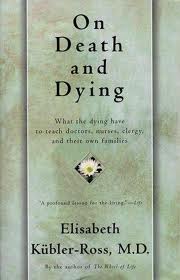 Another in case you missed it, this one from the New Yorker: “Good Grief: Is there a better way to be bereaved?” looks at how we cope with death and loss.
Another in case you missed it, this one from the New Yorker: “Good Grief: Is there a better way to be bereaved?” looks at how we cope with death and loss.
One autumn day in 1964, Elisabeth Kübler-Ross, a Swiss-born psychiatrist, was working in her garden and fretting about a lecture she had to give. Earlier that week, a mentor of hers, who taught psychiatry at the University of Colorado School of Medicine, had asked her to speak to a large group of medical students on a topic of her choice. Kübler-Ross was nervous about public speaking, and couldn’t think of a subject that would hold the students’ attention. But, as she raked fallen leaves, her thoughts turned to death: Many of her plants, she reflected, would probably die in the coming frost. Her own father had died in the fall, three years earlier, at home in Switzerland, peaceful and aware of what was taking place. Kübler-Ross had found her topic. She would talk about how American doctors—who, in her experience, were skittish around seriously ill patients—should approach death and dying…